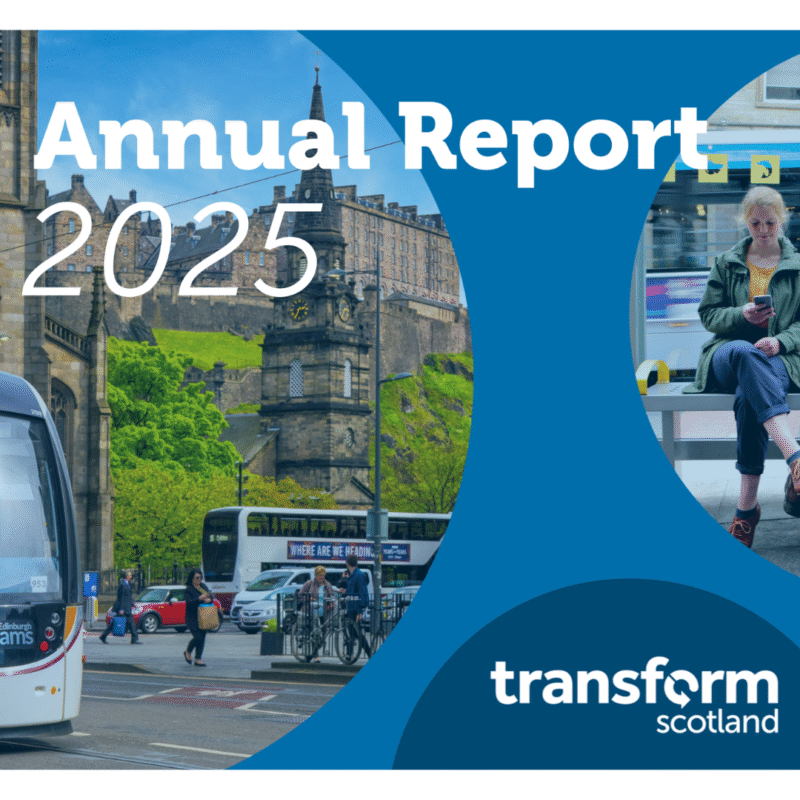Transform communications officer Katherine Scott reports on the Sustainable Transport Cross Party Group’s latest meeting, which focused on last-mile logistics.

The recent meeting of the Cross Party Group (CPG) on Sustainable Transport, convened by Graham Simpson MSP, explored the environmental and logistical challenges posed by last mile deliveries – the final step of the delivery process where goods and services reach their destination.
Bringing together MSPs, industry leaders and campaigners, the session offered insights into how innovations in technology and policy could help reduce congestion, cut emissions, and build a cleaner, more efficient delivery system in Scotland.

What is the “last mile” and why does it matter?
The “last mile” refers to the final leg of a delivery journey – typically from a local depot to the customer’s door. However, this segment is often the most carbon-intensive and inefficient, particularly in congested urban areas.
With parcel delivery demand continuing to rise across Scotland and the UK, addressing the sustainability of this phase is essential for meeting national climate goals and reducing traffic impacts.
Learning from the continent
Oliver Lord, UK Head of the Clean Cities Campaign, opened the session with an international perspective on decarbonising last mile delivery. He highlighted the one million diesel vans added to UK roads since 2015, and called for the introduction of zero-emission zones, inspired by models in countries such as the Netherlands, Denmark and Sweden.
Lord emphasised that these policies should prioritise commercial fleets first, before eventually applying to all vehicles. He pointed to London’s progress in reducing emissions from urban deliveries and stressed the importance of public engagement and political will to implement similar changes in Scotland.
Royal Mail’s “feet on the street” approach
Emma Bayliss-Chan, Head of Climate Strategy and Risk at Royal Mail, described how the postal service is reducing its emissions through a “feet on the street” model -leveraging its 80,000 posties across the UK to minimise reliance on vehicles.
Key highlights from Royal Mail’s sustainability progress include:
- 25% reduction in total emissions since 2021
- Expansion of electric vehicle fleet and staff training
- Innovation trials: e-cargo bikes in Aberdeen, drone deliveries in Orkney, and solar-powered postboxes enabling 24/7 drop-offs of small parcels without needing a post office visit.
Bayliss-Chan also acknowledged constraints: balancing innovation with Royal Mail’s six-day-a-week delivery obligation and commitment to reliability.
Smarter use of kerbspace
Toby Hiles from Grid Smarter Cities showcased a novel approach to managing delivery logistics – through a digital platform that allows real-time booking of kerbside space for delivery vehicles, EV charging, and loading bays.
Likened to Airbnb for loading spaces, the platform improves operational efficiency and reduces unnecessary mileage by guaranteeing space availability, lowering emissions from vehicles that would otherwise circle for parking.
Hiles explained how the system provides valuable data insights for local authorities, and noted that Grid Smarter Cities recently won the British Parking Awards for this innovation.
Discussion highlights
Key themes from the Q&A and discussion included:
- Incentivising innovation: MSPs and campaigners asked how companies are being encouraged to adopt greener practices. Speakers cited customer demand, regulation, and operational savings as driving forces.
- Rural challenges: Attendees questioned the relevance of electric vans and zero-emission zones in remote areas with cold weather. Speakers agreed more technological development is needed and highlighted the importance of context-sensitive solutions.
- Consolidation: There was strong support for parcel collection points, out-of-home delivery networks, and potential incentives for customers to consolidate deliveries – though equity considerations for housebound residents were flagged.
- Learning from history: References were made to the now-defunct postbus service in the Highlands, and how historic models might offer inspiration for future sustainable logistics.
- Behavioural change over tech fixes: A transport academic from Heriot-Watt University warned against relying solely on technology, emphasising the need for a social shift in delivery expectations and behaviour to reduce over-reliance on electric vehicles.
In summary
The meeting provided a snapshot of the pressures, innovations, and policy opportunities surrounding last mile deliveries in Scotland. It highlighted the complex relationship between emissions, delivery efficiency, and urban planning, and stressed the need for collaborative approaches between government, industry and the public.
Colin Howden of Transform Scotland concluded that the insights from this session should be fed into the Scottish Government’s upcoming Climate Change Plan, ensuring last-mile logistics are front and centre in the journey toward cutting emissions.
The next meeting of the CPG on Sustainable Transport will take place on December 2nd, focusing on UK supply chains. The final meeting of the session is scheduled for February 2026, with a focus on international supply chains.
To find out more about the CPG or to join the Group, please contact comms@transform.scot.




